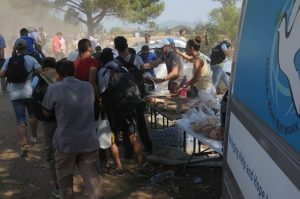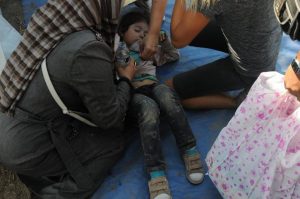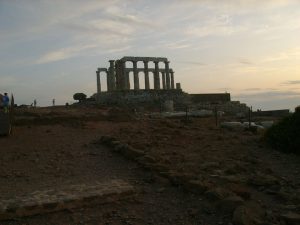Greece (MNN) — It’s been well over a year since the Turkey-European Union agreement was enacted. The move, which stemmed the flow of refugees from Turkey into Greece, has been highly criticized. Human Rights Watch blames the deal for deteriorating mental health conditions in Grecian camps, specifically on the islands.
Stranded in Greece, hope falters
Tasos Ioannidis of AMG International says that the deal “has resulted in the largest number of refugees being stuck in Greece for an extended period of time.”

In the refugee camps. (Photo courtesy of AMG International)
This is because Europe’s borders have been closed to the movement of refugees, and the screening process is slow. And while there has indeed been a reduced flow of refugees coming from Turkey to Greece, Ioannidis says, “It’s still a few thousand every month that are still coming to Greece.”
The Human Rights Watch group recorded incidents of self-harm even to the point of suicide attempts along with heightened aggression, depression, and anxiety.
Ioannidis says poor conditions combined with the fact that these refugees are mostly idle makes for a bad situation.
“As the refugees have come to Greece, a lot of them are indeed in the islands or in some camps in the Athens area. And in some of those places, the conditions are quite bad. And you have people who are living in very basic conditions in tents, in places that are not really designed for long-term housing.
“At the same time, not only do these individuals have to deal with the living conditions that are really very poor, but they also have to deal with the fact that they have nothing to do.”
As a result, Ioannidis says there has been unrest, uprisings, violent incidents, and fires in the camps. The Moria camp on Lesbos has been particularly bad in this regard. People who are stuck in places they don’t want to be, and often after leaving a place that was unsafe to live, find themselves in a desperate situation.

(Photo courtesy of AMG International)
“There is unquestionably a lot of psychological harm that has been done. These individuals, most of them come from areas that they have faced violence. A lot of them have lost loved ones, a lot of them have seen family members being hurt, a lot of them have fled because they are trying to protect those family members.”
In addition to basic physical needs, there has also been tension that has boiled over on more than one occasion. For a variety of reasons, Ioannidis says, groups from Syria, Afghanistan, Iran, Iraq, and Pakistan will often find themselves up in arms with each other.
“These ethnic groups, a lot of them don’t get along with each other. So the government has tried to separate them in some cases.”
But even if they are separated, they may be in the same area. Any time there is a problem, there is an opportunity for one group to blame another group and get into ethnic conflicts.
Stepping into the pain
Poverty, loss, violence, trauma, pain, all on top of material needs — it’s a big problem. But AMG International and partners are stepping in to address these needs wherever they can. AMG mostly focuses on the mainland, but they partner with other organizations on the islands and sometimes send workers there.
“Part of what we encounter as we minister to them, particularly in the different areas on the mainland, is the need to just engage with them and help them process these situations that they have been through and just offer a listening ear and help with the psychological harm that has been done.”
Especially since the movement into Europe slowed significantly, AMG volunteers have been able to spend intentional time with several of the refugees over and over again.
A lot of the refugees are children who’ve come to Greece alone. To protect them from being taken advantage of, there are child-safe facilities where they are receiving the care they need.
Because these people have gone through so much, Ioannidis says they typically are disillusioned towards their religion. But this has given Evangelicals a chance to step in with the Truth.
“So when we are able to come alongside them and help and show the love of Christ in practical ways […], that naturally gives an opportunity to engage with them into deeper discussions. We have seen as the evangelical community in Greece has engaged with the refugees, there are a lot of lives that are being transformed by the Gospel,” he says.
Churches have started among refugees and many people who have received aid from AMG and other organizations are wondering why. It presents a great chance for the Gospel to spread throughout these camps.

(Photo courtesy AMG International via Facebook)
But as these workers and volunteers reach out and listen to the painful stories of the refugees, they are often overwhelmed by the emotional toll. Because of this, Ioannidis says we need to remember to pray for those who are active in sharing the love of Christ with these refugees.
AMG also sees a constant need for more volunteers and more financial assistance so they can continue to provide humanitarian aid and minister to the people there. To get involved, click here.
